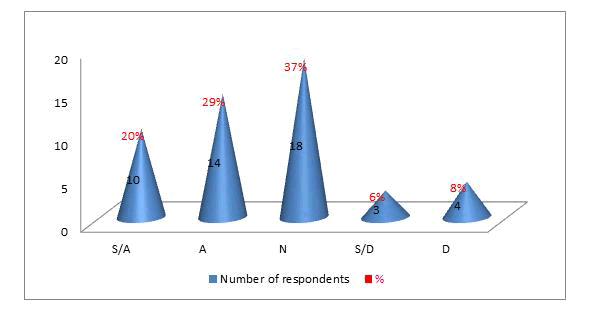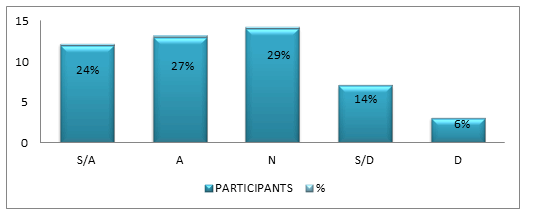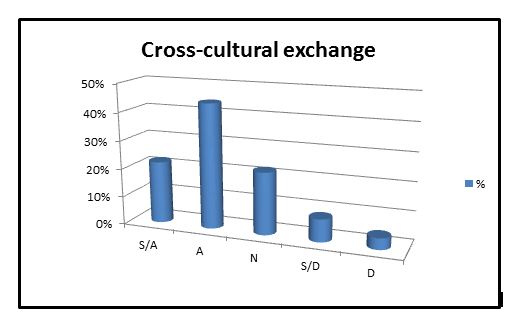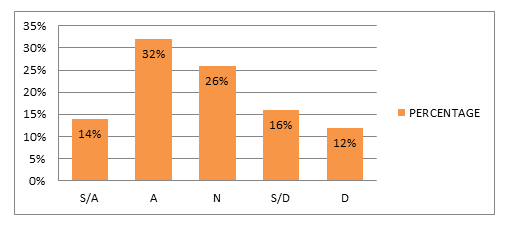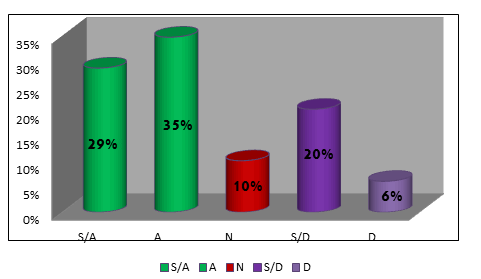Research Article: 2021 Vol: 20 Issue: 6S
Perceptions of Cultural and Heritage Tourism Entrepreneurship Among Students at a Higher Educational Institution in Cape Town
Samson Nambei Asoba, Walter Sisulu University
Nteboheng Patricia Mefi, Walter Sisulu University
Abstract
This study was inspired by the need to increase entrepreneurial opportunities in South Africa. It analysed the opportunity presented by tourism as a possible entrepreneurial field for you entrepreneurs from Universities. The study was based on the position that despite the attacks on colonial heritage sites, they can present possible entrepreneurial opportunities. The study adopted the quantitative approach to collect and analyse the perceptions of entrepreneurship students at a Higher Education Institution. Evidence was found that there were many benefits of heritage entrepreneurship which included creating financial viability, creation of employment and improving the environment and infrastructure in communities. It was also found that most of the students held a positive impression of the role of tourist and tourism entrepreneurship in the communities. They held a good image of the tourist and felt that they did not offer any threat to locals. Youth are recommended to adopt heritage tourism entrepreneurship as employment opportunity.
Keywords
Entrepreneurship, Tourism, Heritage Tourism, Small Business
Introduction
Entrepreneurship in cultural heritage tourism presents a possible opportunity for entrepreneurs in South Africa given its rich history. With reports that levels of entrepreneurship remain relatively low in South Africa (Falconer & Herrington, 2020), exploring the possible pursuance of cultural heritage entrepreneurship is important. This study focuses on the attitudes of Entrepreneurship students at a HEI towards cultural heritage entrepreneurship. The removal of apartheid era heritage sites and artefacts took centre stage during a 2015 (#FeesMustFall) protests which was led by students at Higher Education Institutions (HEI) in Cape Town. The study explores cultural entrepreneurship with specific reference to heritage sites in the view that it presents a possible opportunity for entrepreneurs. Prospects for this opportunity seem to be strong when considering Rofels, Steinbrink & Ulh (2009) who states that tourists feel that heritage and cultural tourism is a “must do” during their stay in Cape Town.
Literature Review
The study was rooted within anthropological entrepreneurship theory which asserts that successful entrepreneurship has a cultural dimension and takes into consideration the cultural contexts, beliefs, artefacts and customs of a people (Simpeh, 2011). Despite heritage sites posing as a good opportunity for tourism and entrepreneurship, it appears that many South Africans tend to have certain emotions and perceptions over them thereby affecting their engagement with them. The White paper on the Development and Promotion of Tourism (1996) describes tourism as the missed opportunity due to the post-emotional dilemma and anger associated with apartheid. Due to the change in regime, South Africa was again an acceptable destination to visit. The country grew such that it became home to international tourism posing different types of tourism offering: (Sport tourism, Leisure tourism, visiting friends and relatives, eco-tourism, historical, educational and medical tourism). After the apartheid era, tourism was then viewed as the key to economic freedom not only for Cape Town but for South Africa as well. Cape Town marked the popular tourist attractions that include: (Robben Island, Table Mountain, Kirstenbosch, Water Front, Cape of Good Hope, the Wine lands). Tourism entrepreneurs spotted an enormous tourism offering in township and heritage tourism that was initiated in Soweto by taking people to townships to reveal what South Africa has to offer apart from beautiful valleys, mountains, but also giving tourists the originality and essence of their visit in South Africa. The growth in cultural and heritage tourism has led to the growth of entrepreneurship related to cultural and heritage entrepreneurial ventures in the townships (Booyens, 2012). Cape Town’s most popular townships Gugulethu, Langa & Khayelitsha are rich in history. Rofels, Steinbrink & Ulh (2009) argue that township tourism in some townships outside of Cape Town differs from those in the bigger Capetonians townships like Langa, Gugulethu & Khayelitsha. Tourism in townships has grown so much, with dynamic people, interesting cultural diversity, historical monuments that tour operators feel obliged to portray to tourists. Many tour operators operate entrepreneurial ventures in township tours to offer diversity and township experience for tourists, providing a service beyond measure and unforgettable. Entrepreneurs in the name of tour operators have become an important part of the tourism industry. Gartner and Lime (2000) highlighted a tour operator entrepreneur contributes annually around 25% of all world tourism travel. Booyens (2010) reckons that the first study done in the township of Soweto in Gauteng on visitor demand and tourism stakeholder perspectives suggested that there is a demand for tourism entrepreneurs to advance township tourism in townships. Township tourism grew in SA mostly targeting foreign tourists visiting the country to showcase the diversity and authenticity of their culture. Booyes (2010) highlights that township tourism is growing faster in popularity than other tourism segments and even faster than the global tourism growth rate. Cross examination on literatures has shown that township tourism and cultural heritage are referring to one thing, to tourism that is based to the core and the originality of people, people’s culture, and their way of living. In several occasion these words are used by different authors but in actual fact meaning is the same.
Methodology
The study adopted the quantitative research approach which quantifies opinions, attitudes and behaviors to establish the attitudes of the students at the HEI towards heritage tourism entrepreneurship. Fifty questionnaires were designed and were all issued, all were closed-ended on a five point Likert scale. Students at a selected HEI from an Entrepreneurship Department were required to respond to the statements showing whether they strongly agree, agree, neutral, strongly disagree, and disagree with the statements. They took three days to complete the questionnaire. Twenty forty-four percent (44%) of the respondents who participated were males while fifty six percent (56%) were females. The fact that the majority of these respondents were females is reflective of the population distribution of the students at the HEI in South Africa as a whole where females are generally more than males. This fact of having more females than males could also have the consequence that more entrepreneurs should consider the needs of females.
Discussion
Awareness of Heritage Tourism Entrepreneurship
Awareness as an issue of culture and heritage tourism entrepreneurship arguably related to the promotion of cooperation between the host environment and the tourist. In fact awareness is a key principle affecting the attitudes towards heritage and cultural tourism. Figure 1 shows residents’ responses on whether they were aware of township tourism entrepreneurship. In the table: S/A = strongly agree, A = means agree, N = neutral, S/D = strongly disagree and D = disagree.
Figure 1: Responses to the Assertion that the Respondent Was Aware of Heritage Tourism Entrepreneurship
As can be deduced above, 64%of the respondents were of the view that they are aware of cultural and heritage entrepreneurship. This shows a high degree of engagement and awareness of opportunities possessed by cultural and heritage entrepreneurship.
Perceptions on whether township tourism has improved standards of living.
The essence of heritage tourism is to create a better place for people to live in, to enable tourism to contribute to good quality of life of people and to ensure that tourism brings a positive experience for local people. Table 1 below shows respondents’ perceptions on whether township tourism entrepreneurship has improved residents’ standards of living or not.
| Table 1 Students’ Perception on Whether Township Tourism Improved Standards of Living? |
|||
|---|---|---|---|
| CODE | Frequency Item | Frequency | Percentage |
| 1 | S/A | 14 | 29% |
| 2 | A | 13 | 27% |
| 3 | N | 9 | 18% |
| 4 | D | 4 | 8% |
| 5 | S/D | 9 | 18% |
| TOTAL | 49 | 100% | |
The majority, twenty- nine percent (29%), and twenty seven percent (27%), of the participants held a very strong view to the effect that township tourism has improved their standards of living. Perceptions on the benefits of cultural and heritage tourism entrepreneurship against the negatives. Heritage tourism entrepreneurship is generally meant to benefit the community in some way and so it is important to analyse whether residents perceive it likewise or otherwise. Figure 2 shows data collected on the residents’ perception on whether the benefits outweigh the negatives.
The data collected, as depicted by Figure 2 shows that thirty percent (37%) of the respondents were neutral, they were not sure whether or not the benefits of township tourism outweighs the negative. But there is another indication of forty- nine percent (49%) of respondents who strongly agreed and agreed that the benefits outweighed the negatives. This suggests the students at the HEI generally believed that responsible township tourism has brought more benefits than negatives to the community and there is a concern about the respondents who were neutral as it is the majority of the respondents.
Perceptions on the Image those Tourists Create
Tourists are mostly perceived to bring about cultural fusion and lead to the integration of different cultures. In cases where people hold ethnocentric views and are not open to external cultures, they may feel threatened with the presence of tourists. One of the aims of heritage tourism entrepreneurship is to ensure that people in the community are comfortable with the presence of tourists and they do not feel threatened. Figure 3 shows students’ perceptions on whether they felt safe around tourists.
The data shown in Figure 3 shows that the majority, eight four percent (84%) of the respondents had the perception that that the community felt safe around tourist. The eighty-four (84%) comes from fiftysix percent (56%) of the residents that strongly agreed and twenty-eight percent (28%) that agreed. This suggests a positive perception on this aspect of responsible tourism.
Perceptions on Environmental Aspects Heritage Tourism Entrepreneurship
Responsible tourism also has environmental aspects associated with it. The sections that follow provide respondents’ perceptions on selected environmental issues.
| Table 2 Respondents’ Perception of Whether Tourism Has Contributed to Cleaner Streets |
||
|---|---|---|
| Response | Frequency | Percentage |
| S/A | 13 | 27% |
| A | 14 | 29% |
| N | 11 | 22% |
| D | 4 | 8% |
| S/D | 7 | 14% |
| TOTAL | 49 | 100% |
Most respondents, twenty nine percent (29%) and twenty seven percent (27%), were in agreement that tourism has contributed to cleaner streets. Although this research did not focus on the actual activities being done to ensure clean streets, it can be argued based on the literature review from the previous chapter that tour operators and others concerned in the management of tourism invest in the cleanliness and attractiveness of the streets to become appealing to tourists. Making sure that streets are clean is relatively important to both host-community and the tourists, clean environment leads to healthier lives.
Community Development
It is generally argued in the literature that community development remains the ultimate goal of heritage tourism entrepreneurship. Respondents’ perceptions on whether tourism has led to increased community development were considered in this research and the results are shown in Figure 4
The above talks to township development in the local community, it is indicative the majority of respondents perceive tourism as a key for township development in general. Fifty-one percent (51%) of the target population were of the view that tourism contributes to development. This is because the locals has turned to be an international form of attraction with so much to offer to tourists as were previously areas of apartheid and hold rich history. Even though the majority of respondents were of this view, there was still a concern, about twenty-nine percent (29%) of the 50 respondents who were neutral about the view, which can mean that they were not sure that township tourism has increased development. Township development includes empowering the community with skills to self-maintain their daily lives, it also incorporates creating opportunities for locals, building what might be useful to tourists while paying their visit but still beneficial to the community.
| Table 3 Development of Infrastructure Due to Township Tourism |
||
|---|---|---|
| Response | Participants | % |
| S/A | 17 | 34% |
| A | 13 | 26% |
| N | 7 | 14% |
| D | 6 | 12% |
| S/D | 7 | 14% |
| TOTAL | 50 | 100% |
As indicated in Table 3, about 60% of the respondents from S/A and A, suggested that there has been notable infrastructure development due to township tourism. It is also worth noting that about 26% of the respondents strongly disagreed and disagreed with this fact.
Perceptions on Cultural Aspects
Analysis of residents’ perceptions on cultural aspects of responsible tourism, this is an important aspect to consider when dealing with host communities. Considering the history of residents, where they originate, it is highly important to take into consideration cultural aspect before conducting any business.
| Table 4 Tourists Show Respect for Culture Lifestyle of Locals |
||
|---|---|---|
| Response Term | Participants | % |
| S/A | 22 | 44% |
| A | 23 | 46% |
| N | 5 | 10% |
| D | 0 | |
| S/D | 0 | |
| TOTAL | 50 | 100% |
Table 5 shows that 46% of the respondents agrees to the fact that tourists respect cultural lifestyle of locals while forty four percent (44%) strongly agreed.
Tourist and promotion of cross-cultural exchange
It is mentioned in the literature that tourists are mostly interested in meeting and engaging with the locals on their visit to the township. Below is the chart with respondents indicating that locals have learnt from tourists in as much as they learn about their values and traditions?
Figure 5 depicts that sixty percent (60%) of the respondents agrees and strongly agrees that meeting with tourists has promoted cross-cultural exchange.
Economic Benefits from Tourism Entrepreneurship
In the literature review it is generally argued that township tourism bring about economic benefits to host-communities creating employment. Figure 6 shows the perception of the students on whether tourism entrepreneurship was beneficial
Figure 6 illustrates that 46% of the respondents agrees that and strongly agreed that residents benefits economically from township tourism, while there is 26% that is neutral. This shows that they are neither of the view nor against, which is a concern as they take more than half of respondents. 28% disagreed with the view and this is quit number of respondents that feel that locals do not benefit from township tourism and this means that something should be done as this may in the long run affect growth in tourism in the township.
Creation of Employment
The views of the students on whether tourism heritage entrepreneurship creates employment are depicted in Figure 7.
The above chat illustrates that, 64%, of the students perceive that township tourism provides worthwhile employment while half of the respondents (26%) disagrees with the view that township tourism has provided worthwhile employment for the locals.
| Table 5 Tourism Entrepreneurship Created Income-Generating Opportunities in Communities |
||
|---|---|---|
| Response | Participants | % |
| S/A | 13 | 26% |
| A | 11 | 22% |
| N | 7 | 14% |
| D | 7 | 14% |
| S/D | 12 | 24% |
| TOTAL | 50 | 100% |
The above table shows that 48% of the respondents agree with the view that income generated in township is distributed across the community.
Conclusion
The study explored the case for heritage tourism entrepreneurship as an opportunity for entrepreneurship. The study found evidence that there are positive perceptions among entrepreneurship students on tourist and how they impact the life in communities in South Africa. It was established that heritage entrepreneurship presents many benefits which included creating financial viability, creation of employment and improving the environment and infrastructure in communities. It was also found that most of the students held a positive impression of the role of tourist and tourism entrepreneurship in the communities. Therefore, University graduates from the entrepreneurship departments in HEI should consider engaging in Heritage tourism entrepreneurship
Recommendations
It is recommended that students in HEI should capitalize on the entrepreneurial opportunities presented by heritage tourism entrepreneurship in South Africa. Universities should also provide relevant education to ensure this. At the same time government is recommended to open up avenues for heritage entrepreneurship.
References
- Balnaves, M., & Caputi, P. (2001). Introduction to quantitative research methods: An Investigative Approach. Bonhill: SAGE Publications.
- Batta, R.N. (2020).Tourism and the environment. A quest for sustainability: With special reference to developing countries, and policy analysis on Himachal Pradesh. New Delhi: Gidwani.
- Beaver, A. (2005). A dictionary of travel and tourism terminology. Wallingford: CABI Publications.
- Booyes, I. (2010). Rethinking township tourism: Towards responsible tourism in South African townships. Development Southern Africa, 27(2), 1-16, June.
- Bradley, J., Bradley, L., Fine, V., & Vidar, J. (2011). South Africa Lesotho & Swaziland.
- Budeanu, A. (2005). Impacts and responsibilities for sustainable tourism: A tour operator’s perspective. Journal of Cleaner Production, 13(2), 89-97.
- Burns, P.M., & Novelli, M. (2007). Tourism and politics: Global Frameworks and Local Realities.Netherlands:Elsevier.Responsiblehandbookguidlines:http://www.capetown.gov.za/en/tourism/Documents/Responsible%20Tourism/Tourism_RT_Responsible_Tourism_Handbook.pdf.
- Carey, S., & Gountas, Y. (1997). Tour operators and destination sustainability. Tourism Management, 18(7), 425-431.
- Carol, I. (2008). Travel and tourism. The Global Village.
- Churchill, G.A., & Lacobucci, D. (2009). Marketing research: Methodological foundations. Ohio: South-Western Cengage Learning.
- Delic, J.M. (2011). Trends in slum tourism. School of hospitality and tourism management.
- Dodds, R., & Kuehnel, J. (2010). CRS and Canadian mass tour operators: Good awareness but little action. International Journal of Contemporary Hospitality Management, 22(2), 221-244.
- Falconer, B.A., & Herrington, M. (2020). Global entrepreneurship monitor South Africa (GEM SA) 2019/2020 report: Igniting start-ups for economic growth and social change. Cape Town: University of Stellenbosch Business School.
- Gartner, W.C., & Lime, D.W. (2000).Trends in outdoor recreation, leisure and tourism. Wallingford: CABI Publishing.
- George‚ R., & Frey‚ N. (2010). Responsible tourism management: Using social marketing to create positive change. South Africa Journal of Business Management, 41(1), 11–23
- Goggard, W., & Melville, S. (2004). Research methodology: An Introduction. Lansdowne: Juta
- Gountas, Y., & Carey, S. (1997). Tour operators and destination sustainability. Tourism Management, 18(7), 425-431.
- Heynes, R., Boekstein, M., & Spencer, J. (2000).Introduction to travel and tourism. Kenwyn: Juta & Co Ltd.
- Holden, A., & Fennell, D.A. (2012). The routledge handbook of tourism and the environment. Routledge.
- Hulsekopf, K. (2011). Tourism as an opportunity: Women in the townships of Cape Town. Berlin: Humbolt.
- Jolliffe, L. (2003). Seasonality in tourism employment: Human resource challenges. International Journal of Contemporary Hospitality Management, 15(6), 312-316.
- Kohl, M., Magnuseen, S., & Marchetti, M. (2006). Sampling methods, remote sensing and GIS Multiresource. Hamburg: Springer.
- Kumar, R. (2011). Research methodology: A step-by-step guide for beginners. New Dheli: SAGE publication.
- McCool, S.F., & Moisey, R.N. (2008).Tourism, recreation and sustainability: Linking culture & the environment. CABI: Oxfordshire.
- Mengich, O. (2011). Township tourism: Understanding tourist motivation. Gordon Institute of Business Science.
- Miller, G. (2001). Corporate Responsibility in the UK Tourism Industry. Tourism Management, 22(6), 589 - 598.
- Muhanna, E. (2009). The contribution of sustainable tourism in development in poverty alleviation of local communities in South Africa. Journal of Human Resources in Hospitality & Tourism, 6(1), 37-67.
- Nykiel, R.A. (2007). Handbook of marketing research methodologies for hospitality and tourism. Abingdon: The Haworth Hospitality & Tourism Press.
- Page, S., & Connell, J. (2007).Tourism: s modern synthesis. (2nd edition), London: Thomson.
- Persoon, W., & Wijk, J.V. (2006). A long-haul destination: Sustainability reporting amongst tour operators. European Management Journal, 24(6), 381-395.
- Polit, D.F., & Hungler, B.P. (1999). Nursing research: Principles and Methods (6th edition). Philadelphia: J.B. Lippincott.
- Rajasekar, S. (2006). School of physics: Research methodology. India: Tamilnadu.
- Ramchander, P. (2004). Towards the responsible management of socio-cultural impacts of township tourism. Pretoria: University of Pretoria, Department of Tourism Management. Retrieved from http://trc.upei.ca/sites/discoveryspace.upei.ca.trc/files/A_Study_of_Cultural_Tourism.pdf.
- Reisinger, Y., & Turner, L. (2003). Cross-cultural behaviour in tourism. Netherland: Elsevier.
- Richards, G. (2007). Cultural tourism: Global and local perspectives. New York: Binghamton.
- Rolfes, M., Steinbrink, M., & Uhl, C. (2009). Township as attraction: An empirical study of township tourism in Cape Town.
- Sheldon, P.J. (1986). The tour operator industry analysis. Annals of tourism research, 13, 349-365.
- Simpeh, K.N. (2011).Entrepreneurship theories and Empirical research: A summary review of the literature. European Journal of Business and Management, 3(6), 1-8.
- Spencely, A. (2007). Responsible practices by South African Tour Operators. International Centre for Responsible Tourism: Durban.
- Spencely, A. (2012). Responsible tourism: Critical issues for conservation and development. Anon: Routledge.
- Sukamolson, S. (2007). Language Institute Chulalongkorn University: Fundamentals of quantitative research. Bangkok: Pathum Wan.
- Swarbrooke, J. (1999). Sustainable tourism management. Business & Economics, Wallington: CABI-International.
- Tepelus, C.M. (2005). Aiming for sustainability in the tour operating business. Journal for Cleaner Production, 13, 99-107.
- Walker, W. (2005).The strengths and weaknesses of research designs involving quantitative measure. Journal of Research in Nursing, 10(5), 571-578.

